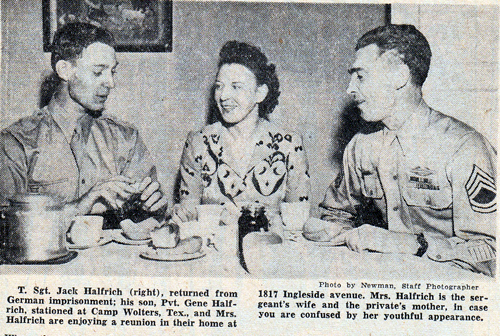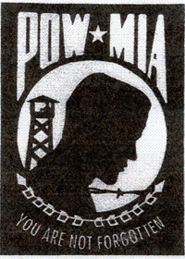PRISONER TWO YEARS IS FREED
S. Sgt. Jack Halfrich in France Awaiting Return Home
S. Sgt. Jack Halfrich, a prisoner of the Germans for more than two years, has been liberated, according to word received by his wife, Mrs. Ann Halfrich, who resides at 1718 Ingleside avenue.
S. Sgt. Halfrich wrote that he is now in France and excepts to return home in July. He was captured in February, 1943, in north Africa.
He had been held at the stalag 3-B prisoner camp. A member of the 34th division, he had been in the national guard for 14 years before the guard was called to active duty.
A son is in the army at Camp Wolters, Tex. Three sisters live here -- Mrs. Bertha Astor, 1112 Sixth street; Mrs. Dora Hackett, 2236 River drive; and Mrs. Edith Udell, 2017 Ingleside avenue.
Source: The Sioux City Journal, May 30, 1945
![]()

T. Sgt. Jack Halfrich (right) returned from German imprisonment; his son, Pvt. Gene Halfrich, stationed at Camp Wolters, Texas and Mrs. Halfrich are enjoying a reunion in their home at 1817 Ingleside Avenue. Mrs. Halfrich is the sergeant’s wife and the private’s mother, in case you are confused by her youthful appearance. |
Father, Back From German Prison Camp, Enjoys a Reunion With His Soldier Son
T. Sgt. Jack Halfrich Had Many Thrilling Experiences
By Editha K. Webster
There was talk about “hide and seek” the subject being G. I. neckties. There were prideful paternal glances from father to son, both in army uniform, as well as breakfast merriment in the home of T. Sgt. Jack Halfrich, 1817 Ingleside Avenue. Sgt. Halfrich, father of Pvt. Gene Halfrich is back from German imprisonment.
Deep, affectionate undercurrents tossed conversation back, again and again, from the parent who was being interviewed to the lad in uniform. Eighteen years of age now, he had been a slim teenager when his dad had left for war February 16, 1941. Gene is in basic training at Camp Wolters, Texas.
Yet, the conversation which veered from the sergeant to his son was far from dull. Sgt. Halfrich went from Council Bluffs as a bandsman with Iowa infantrymen to Camp Clairborne and from there to Ireland and to Tunisia. He was captured February 19, 1943, when wounded at Kasserine Pass. He lived in one after another German prison camp for more than two years before his release May 3 of this year.
Short Lived Escape
There was one brief respite from prison life when on a march between camps he escaped and lived for almost two months in the woods and in German villages, seeking to get to the American lines. But eventually he was recaptured.
Quite definitely does the sergeant’s account of release from Altengrabow, the last of his prison camps, illustrate the manner of allied victory.
One night, the sergeant related, three British officers and two Americans landed by parachute with Altengrabow. The British major, who headed the group, demanded of the German colonel in authority that the camp be turned over to them, and he set a certain hour for the transfer.
The German refused and the British and American officers were taken into custody.
American prisoners then were lined up for another march to another camp. There had been 51 days of such marching before that time, the sergeant said.
When they were in line, the British major spoke.
As the sergeant recalls his words, they were as follows;
“Men, I am from Gen. Eisenhower,
“Your orders are that you will remain in this camp. Do not move. Sit Down!”
Expecting machine-gun fire, Sgt. Halfrich said, they sat down. To their amazement, he continued, they were returned to their billets after examination by a German camp doctor who pronounced 90 per cent of them unfit for marching. Later in the day it was announced by the prisoners’ own “confidence men” that the camp had been turned over to the invading British and American officers, as they had demanded.
Next day, the story concludes, American trucks came to carry them away. They went through the German lines to Hildesheim and from there by air transport to France. They docked in New York June 29 from the U.S.S. Queen Elizabeth, escorted by dirigible and helicopters with a great welcome that included music, speeches and all the fresh milk and doughnuts they wanted from the Red Cross.
“Which,” interrupted the sergeant “is a truly wonderful organization.”
There are dozens of stories, all good, in the sergeant’s overseas experiences. Some are humorous, like the one about the time when his band leader, Warrant Officer Keith Latey of Council Bluffs, climbed into the sergeant’s foxhole during a bombing in Tunisia. They were sitting there, back to back, when they heard a loud clicking noise and “were sure” they had been shot. But the fact was that they had fallen asleep and the “direct hit’ had been that of one steel helmet on another.
There were stories of German housewives, in terror of Americans, until one of them found her baby, his face covered with chocolate, in the arms of a G.I. There were stories of the Hitler youth, “dangerous, too,” the sergeant said on their assignments to recover escaped prisoners.
But again and again the speaker turned from the past to the present; from souvenirs of Ireland and talk of his Dublin hosts, Dr. and Mrs. Harry Parker; from the Red Cross log, kept during the prison camp years, and from razors, a stove and other mementoes of those same times when a pack of Red Cross cigarets proveld valuable currency.
Exchange Souvenirs
Gene was carrying a trick cigarette case, German made. Gene was wearing his dad’s fine wrist watch, too.
But dad was wearing his son’s G.I. necktie and he joked about it and boasted about it in the way that dads have a right to do. And finally, like something that just couldn’t be suppressed any longer, the deep, strong undercurrent that had dominated the entire interview, came to the surface.
The sergeant looked at his pretty, red-haired wife.
“She doesn’t look old enough to have a boy in the army, does she?” he queried.
Sgt. And Mrs. Halfrich will go to Miami, Florida in September. He is to report there for rest and possible discharge. Pvt. Gene Halfrich will return soon to Camp Wolters.
Sgt. Halfrich wears impressive decorations that include a presidential citation bar, the Purple Heart bar with cluster to designate more than one battle wound, a good conduct bar; the combat infantryman badge, and pre-Pearl Harbor, American theater and European theater bars. The last carries three campaign stars and a spearhead for an assault landing.
But Sgt. Halfrich wears also (and this seemed to be important) his only son’s khaki necktie.
Source: The Sioux City Journal, July 15, 1945 (photo included)
![]()

